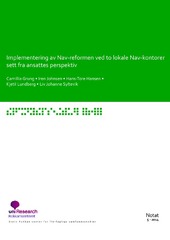| dc.contributor.author | Grung, Camilla Bysheim | eng |
| dc.contributor.author | Johnsen, Iren | eng |
| dc.contributor.author | Hansen, Hans-Tore | eng |
| dc.contributor.author | Lundberg, Kjetil G. | eng |
| dc.contributor.author | Syltevik, Liv Johanne | eng |
| dc.date.accessioned | 2015-02-12T13:09:58Z | |
| dc.date.accessioned | 2020-12-10T06:31:42Z | |
| dc.date.available | 2015-02-12T13:09:58Z | |
| dc.date.available | 2020-12-10T06:31:42Z | |
| dc.date.issued | 2014-05 | eng |
| dc.identifier.issn | 1503-0946 | |
| dc.identifier.uri | https://hdl.handle.net/1956/9380 | |
| dc.description.abstract | Implementation of the labour and welfare reform (Nav) at two local offices seen from the staff’s perspective In this paper the implementation of the labour and welfare reform (Nav) in Norway is studied from the perspective of the staff at two local Nav offices. The study is based on qualitative interviews with employees at two medium sized local offices who come from the three previous departments (Labour directorate, The National Insurance Service and Social Assistance offices). The study shows that there are many common experiences at the two offices; the training is experienced as imperfect and the division of labour follows the previous departmental structures. However, since the processes have been handled somewhat differently there is a different feeling of togetherness and community at the two offices. In addition to the preciously organizational cultures that still seems to alive at both offices, there also seems to have arisen new and perhaps in the future more important dividing lines. One of them is the emerging dividing line between those who are employed by the state and the municipalities. This has to do with rights and social goods, but also important processes as regarding how users should be engaged and treated. Another dividing line is between those who meet the clients when they visit the local offices and those who shall supervise and handle their problems afterwards. With regard to the offices external environment there seem to have arisen a new and important conflict line between the local offices and the newly established central administrative agencies, something that has to do both with competition about qualified staff and questions about division of labour. The paper was originally conceived as an article, but for various reasons it was left too long in the «tray». When we brought it up again, we discovered that it in our opinion were still relevant and interesting not least with regard to understand the Nav‐reform, but at the same time we also saw that to develop the paper into a scientific article would require that we undertook new interviews at the offices, which was not possible for us to do. The paper is accordingly not current with new literature in the field after it was originally written (June 2009). The memorandum is written as a part of NFR project «Evaluation of the Nav‐reform» led by Rokkan Centre. | en_US |
| dc.language.iso | eng | eng |
| dc.publisher | Stein Rokkan Centre for Social Studies | eng |
| dc.relation.ispartofseries | Working paper 05-2014 | en_US |
| dc.subject | Local Nav offices | eng |
| dc.subject | implementation | eng |
| dc.subject | ideals and realities | eng |
| dc.title | Implementering av Nav-reformen ved to lokale Nav-kontorer sett fra ansattes perspektiv | eng |
| dc.type | Working paper | eng |
| dc.rights.holder | Copyright Stein Rokkan Centre for Social Studies. All rights reserved. | |
| dc.description.version | publishedVersion | |
| dc.subject.nsi | VDP::Samfunnsvitenskap: 200 | nob |
